

Defining Bullying in the Classroom. To Teach Math, Study Reading Instruction. The Problem With Math Problems: We're Solving Them Wrong. Photo The following question, from a mother concerned about her daughter’s math education, landed in my email box recently:
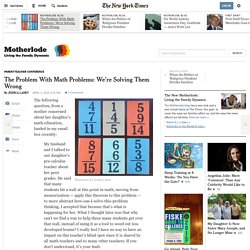
The 8 Skills Students Must Have For The Future. Editor’s note: This is a revised version of an article written by Katie Lepi that originally appeared on June 7th, 2014.
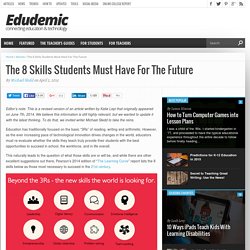
We believe this information is still highly relevant, but we wanted to update it with the latest thinking. To do that, we invited writer Michael Sledd to take the reins. Education has traditionally focused on the basic “3Rs” of reading, writing and arithmetic. However, as the ever increasing pace of technological innovation drives changes in the world, educators must re-evaluate whether the skills they teach truly provide their students with the best opportunities to succeed in school, the workforce, and in life overall. How Does the Brain Learn Best? Smart Studying Strategies.
In his new book, “How We Learn: The Surprising Truth about When, Where, and Why It Happens,” author Benedict Carey informs us that “most of our instincts about learning are misplaced, incomplete, or flat wrong” and “rooted more in superstition than in science.” That’s a disconcerting message, and hard to believe at first. But it’s also unexpectedly liberating, because Carey further explains that many things we think of as detractors from learning — like forgetting, distractions, interruptions or sleeping rather than hitting the books — aren’t necessarily bad after all.
The Deconstruction of the K-12 Teacher — The Atlantic. Whenever a college student asks me, a veteran high-school English educator, about the prospects of becoming a public-school teacher, I never think it’s enough to say that the role is shifting from "content expert" to "curriculum facilitator.
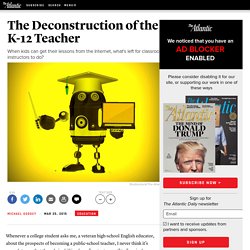
" Instead, I describe what I think the public-school classroom will look like in 20 years, with a large, fantastic computer screen at the front, streaming one of the nation’s most engaging, informative lessons available on a particular topic. The "virtual class" will be introduced, guided, and curated by one of the country’s best teachers (a.k.a. a "super-teacher"), and it will include professionally produced footage of current events, relevant excerpts from powerful TedTalks, interactive games students can play against other students nationwide, and a formal assessment that the computer will immediately score and record. "So if you want to be a teacher," I tell the college student, "you better be a super-teacher. " I started reflecting. The 40 Reflection Questions. What Are the Most Powerful Uses of Tech for Learning?
Student produce a web show with tablets (Brad Flickinger/Flickr) When we talk about the digital divide in education, the discussions revolve mainly around two factors: lack of access to the internet and lack of knowing how to use that access in powerful ways that can fuel learning beyond consuming content.
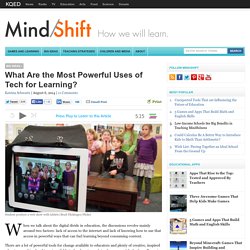
There are a lot of powerful tools for change available to educators and plenty of creative, inspired educators working hard to put available technology to work in classrooms. A lack of excellence is not the problem in education; access to technology and guidance for participating in the digital space in powerful ways are much bigger challenges. That is the message Karen Cator, president and CEO of Digital Promise and former head of the Office of Technology at the US Department of Education, is spreading around the country.
30 Killer Resources For Gamifying eLearning. Five-Minute Film Festival: Freedom to Fail Forward. Failure is an inevitable part of life, but it's often accompanied by shame -- most people do everything in their power to avoid it.

But to paraphrase educational philosopher John Dewey, a true thinker learns as much from failures as from successes. What if educators worked to take some of the sting (and the stigma) out of failing, and encouraged reflection and revision to build upon the lessons learned? Perhaps there's a goldmine of opportunities if we can re-frame failure as a valuable learning experience, an essential step along the path to discovery and innovation. Check out this list of videos to help start the conversation about embracing failure. Video Playlist: Freedom to Fail Forward Watch the player below to see the whole playlist, or view it on YouTube.
More Resources on Embracing Failure. Sans titre. Quality unit instruction combined with differentiated instruction transforms "the game called school" into a meaningful journey where learners understand and connect with the curriculum on a daily basis, whether the approach is project-based learning (PBL), Understanding by Design (UBD), or any other unit design that connects a deep understanding of content and a mastery of skills and concepts to real-world contexts.
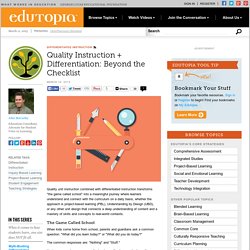
The Game Called School When kids come home from school, parents and guardians ask a common question: "What did you learn today? " Why Kids Take On Adults’ Math Anxiety. We know a lot about how relationships can enhance learning.
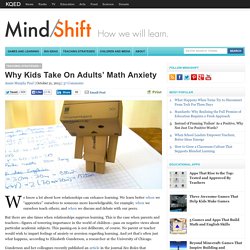
We learn better when we “apprentice” ourselves to someone more knowledgeable, for example; when we ourselves teach others; and when we discuss and debate with our peers. But there are also times when relationships suppress learning. This is the case when parents and teachers—figures of towering importance in the world of children—pass on negative views about particular academic subjects. Is Homework Helpful?: The 5 Questions Every Teacher Should Ask. Posted 10/13/2014 5:16PM | Last Commented 12/02/2014 4:29PM The Common Core has asked teachers to increase rigor by diving deeper into the material.
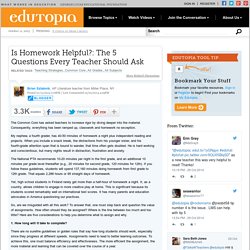
Consequently, everything has been ramped up, classwork and homework no exception. My nephew, a fourth grader, has 40-50 minutes of homework a night plus independent reading and projects. Mental Health May Depend on Creatures in the Gut. Teachers: What's Your Motto in the Classroom? How Relearning Old Concepts Alongside New Ones Makes It All Stick. iStock By Samara Freemark and Stephen Smith, American RadioWorks UCLA researcher Dick Schmidt gazes across the driving range at a line of golfers trying to improve their game.
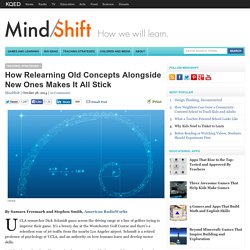
It’s a breezy day at the Westchester Golf Course and there’s a relentless roar of jet traffic from the nearby Los Angeles airport. Schmidt is a retired professor of psychology at UCLA, and an authority on how humans learn and develop motor skills. Measuring Students’ Self-Control: A ‘Marshmallow Test’ for the Digital Age. Credit: Dana Nelson The “marshmallow test” invented by Stanford psychologist Walter Mischel and colleagues in the 1960s is famously known as a measure of willpower.
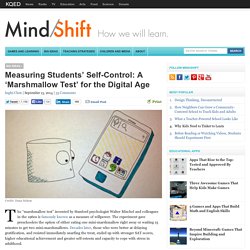
The experiment gave preschoolers the option of either eating one mini-marshmallow right away or waiting 15 minutes to get two mini-marshmallows. Decades later, those who were better at delaying gratification, and resisted immediately snarfing the treat, ended up with stronger SAT scores, higher educational achievement and greater self-esteem and capacity to cope with stress in adulthood. Now other psychology researchers have come up with a test that challenges the willpower of schoolkids to resist the brain-candy of today’s digital distractions — the YouTube videos, Instagram and mobile gaming apps like Angry Birds. The Science of Learning and the Learning of Science. Forget About Learning Styles. Here’s Something Better. Tuesday, October 15, 2013. Desirable Difficulties in the Classroom. Over the last couple of decades, learning and memory researchers have become increasingly interested in bringing scientific findings out of the lab and into the classroom, where they can be implemented into teaching methods to produce more efficient and effective learning.
What Keeps Students Motivated to Learn? Educators have lots of ideas about how to improve education, to better reach learners and to give students the skills they’ll need in college and beyond the classroom. Why Kids Need to Tinker to Learn. What’s the ‘Sweet Spot’ of Difficulty For Learning?